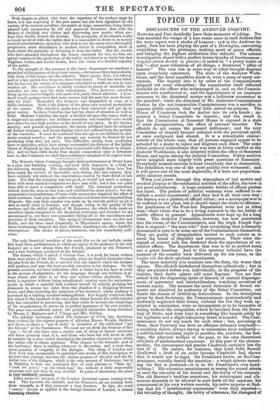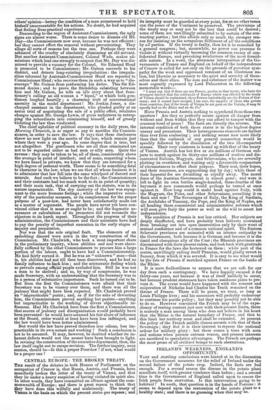TOPICS OF THE DAY.
DISCLOSURES OF THE ANDOVER INQUIRY.
NATURE and Fate decidedly have their moments of joking. Na- ture moulded the visage of a late comic actor in such fashion that his mere aspect was a stroke of humour ; and in the Andover in- quiry, Fate has been playing the part of a Howleglas, converting everything into the ro•rotesque, making sport of grave officials, and bringing the highest authorities into ridicule. The solemn investigation closed with a perfect bonne-bouche of facetiousness : turpiter atrum desinit in ptscem—it ended in " a pretty kettle of fish "—that most ridiculous of all things, a frustrated , affair of honour." The case has in some way or other brought disgrace upon everybody concerned. The state of the Andover Work- house, and the -local squabbles about it, were a mass of nasty cor- ruption. The inquiry into it by order of the Commissioners dragged out more obscenities ; the examination itself reflected discredit on the officer who mismanaged it, and on the Commis- sioners who misdirected it; and the appointment of an improper successor to the dismissed master was a ludicrous recurrence to the mischief; while the dismissal of Mr. Assistant-Commissioner Parker by the not immaculate Commissioners was a sacrifice to appease public opinion, that very little served its purpose. The House of Commons took the matter into its own hands ; ap- pointed a Select Committee to inquire ; and the result is, that the Commission at Somerset House is exposed in a state of utter disorganization, the effect of internal disorder. The officials do not escape the general defilement ; and the very Committee of inquiry became infected with the prevalent spirit, at once malignant and absurd. It is a remarkable charac- teristic of the whole case, that all persons engaged appear to be actuated by a desire to injure and disgrace each other. The same direct personal malevolence that was seen in bitter conflict at the Andover Workhouse, is also detected within the office at Somerset House, and again among the judicial Committee. Paltry motives never mingled more largely with great questions of humanity. Everybody seemed anxious to hunt everybody else to destruction. The exhibition was one of the most painful ever witnessed ; and it will prove one of the most deplorable, if it have not proportion- ately salutary results. When you pierce through this atmosphere of bad motive and crooked purpose to the substantial realities of the affair, the view is not more satisfactory. A huge pedantic bubble of official purism has burst. The purists of political economy were suffered to es- tablish a model department ; and they had it all their own way : the bureau was a pattern of official virtue ; not a newspaper was to be suffered in the place, lest it should tempt the clerks to idleness ; the gentlemen of the Poor-law Department were not as other men—their virtue was to be a living reproach to the lax habits of public officers in general. Appearances were kept up for a long time. The Andover Committee, however, has now penetrated into the rooms of the Commissioners, and the triple Joseph Sur- face is exposed : " the man who " does everything that is formally denounced is sure to be some one of the Commissioners themselves. They are guilty of irregularities carried to such extent as to merit the terms of illegality and corruption. Their utter dis- regard of correct rule has rendered them the opprobrium of ex- ecutive offices. The department that was to be so perfect turns out a great humbug. And to this spurious tribunal have the paupers of the country been delivered up for ten years, as the corpus vile for their specious experiments. The more minutely you examine into the facts, the worse they appear. The officials misbehaved themselves collectively ; but as they are paraded before you individually, in the progress of the inquiry, their faults appear still more flagrant. You are first struck with the disgusting i spirit of discord, of mutual disparage- ment, of oppression and insubordination, watching occasions of mutual injury. The moment the usual restraints of formal eti- quette are dissolved by authority of the Select Committee, out bursts the stream of bottled-up malevolence. In the description given by their Secretary, the Commissioners systematically and uniformly neglected their duties,. violated the law they were ap- pointed to administer, were so incompetent as to be incapable of acting without the compulsion which heinvoked from the Secre- tary of State, and were kept in something like bounds solely by his vigilance and a slight remaining dread of scandal. The Com- missioners do not say much for each other ; but, according to them, their Secretary has been an officious obtrusive busybody— a sneaking fellow, always trying to undermine their authority-- a cold-blooded martinet, eager to sacrifice the comforts, the feel- ings, the physical welfare of the poor, to his own theoretical crotchets of mathematical exactness. In this part of the chance- medley, the circumspect and precise Chadwick certainly has the best of it. He asserts, for instance, that Lord John Russell disallowed a draft of an order because Chadwick had shown that it would not be legal. Sir Frankland Lewis, an Ex-Com- missioner, roundly denied the assertion : a rough minute record- ing the fact is produced—it is in Sir Frankland's own hand- writing ! His excessive astonishment at seeing the record attests at once the sincerity of his denial and the laxity of his memory. The old Baronet's reckless assertions, his extravagant and cla- morous demands to be allowed to pour forth all his candour, his amazement at his own written records, his naive surprise at find- ing that his " interlocutory expressions" were duly reported— the triviality of thought, the levity of utterance, the disregard of
others' opinion—betray the condition of a man accustomed to hold hiniself unaccountable for his actions. No doubt, he bad acquired that feeling from practical experience.
Descending to the region of Assistant-Commissioners, the ugly signs are almost worse. There is some desire to dismiss old Mr. Day—the Commissioners now aver, because he was not efficient : but they cannot effect the removal without prevaricating. They allege all sorts of reasons but the true one. Perhaps they were ashamed of the cruelty of absolutely dismissing an old servant. But another Assistant-Commissioner, Colonel Wade, makes ad- missions which lead one strongly to suspect that Mr. Day was dis- missed to provide a vacancy for the Colonel. Sir Edmund Head is promoted to be Commissioner; Mr. Gulson succeeds to his district, and detects long-existing irregularities : the irregula- rities tolerated by Assistant-Commissioner Head are reported to Commissioner Head ; who receives them in such a way as to " dis- courage" Mr. Gulson from performing his duties. This Sir Ed- mund denies ; and to prove the friendship subsisting between him and Mr. Gulson, he tells an idle story about that func- tionary's calling an old woman a " biped," at which both gen- tlemen laughed heartily ; a charming trait of conversational amenity in the model department I Mr. Jenkin Jones, a dis- charged assistant in the department, who pleaded guilty at an assize trial of negotiating the sale of a public office, retaliates charges against Mr. George Lewis, of gross unfairness in entrap- ping the subordinate into criminating himself, and of grossly violating the law thus vindicated. The chief upholder of political economy in the daily press, the Morning Chronicle, is as eager as any to sacrifice the Commis- sioners, in order to save the law. It says that these disclosures throw no new light on the merits of the law, which remain just where they were a year ago. In some degree that is true, but not altogether. The gentlemen who are all thus criminated are not to be regarded either as bad men or silly men. Quite the reverse : they may be taken to be, all of them, considerably above the average in point of intellect; and of some, respecting whom we have heard in private, we know that they are esteemed for a high degree of personal worth. There seems to be something fatal to character in the law, when we see that all whose business it is to administer that law fall into the same whirlpool of discord and misrule. And such we believe to be the fact : the Commissioners and their assistants had too much work to do in point of quantity; and their main task, that of carrying out the statute, was in its nature impracticable. The dry austerity of the law was repug- nant to the more humane feelings ; while the imperative neces- sity of the particiflar measure, or its completeness for the proper purpose of a poor-law, had never been satisfactorily made out as a matter of argument. The people have never yet been con- vinced either that it must or ought to be ; and the dogmatic as- surances or calculations of its promoters did not reconcile the oteictors to its harsh aspect. Throughout the progress of their ad nistration, the Commissioners and their assistants have had to pay the penalty of imperfect execution in the early stages of inquiry and preparation. Nor was that the sole original fault. The elements of an enfeebling discord were sown in the very construction of the Commission. Mr. Chadwick, who took a most important share in the preliminary inquiry-, whose abilities and zeal were cheer- Sully suffered by the other Commissioners to procure him a large portion of the labour, ought to have had a Commissionership. He had fairly earned it. But he was an " unknown " man—that is, his abilities had not till then been discovered, and he had no family influence to back him ; and the aristocratic feeling which so prevails among official people excluded him. Still he was not a man to be shelved ; and so, by way of compromise, he was made Secretary, with an understanding that the Secretary was to be a person of substantive importance. Such he turned out to be. But from the first the Commissioners were afraid that their Secretary was to be viceroy over them, and there was all the jealousy that might have been expected. Mr. Chadwick proved an "impracticable" purist; and, as if for the sake of thwarting him, the Commissioners proved anything but purists—anything but impracticable to the -working of divers objectionable in- fluences. Had Mr. Chadwick been from the first a Commissioner, that source of jealousy and disorganization would probably have been prevented : he would have assumed his fair share of influence at the Board, order would at least have been less infringed, and the law would have been better administered.
But would the law have proved therefore less odious, less im- practicable in its own nature and working ? Such a conclusion is not to be assumed. It may, however, be doubted whether its in- herent defects would not the sooner have been brought to light. In revising the construction of the executive department, then, the law itself ought not to escape revision. The further inquiry, next session, should be—Is this a proper Poor-law ? if not, what would be a proper one ?



























 Previous page
Previous page